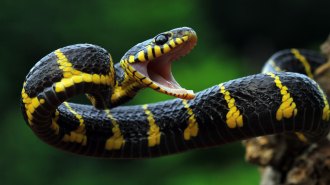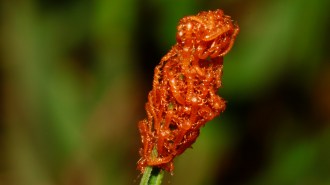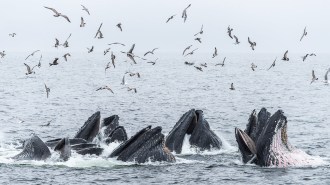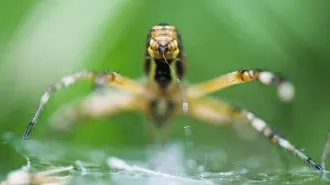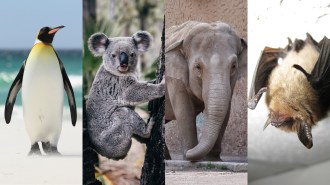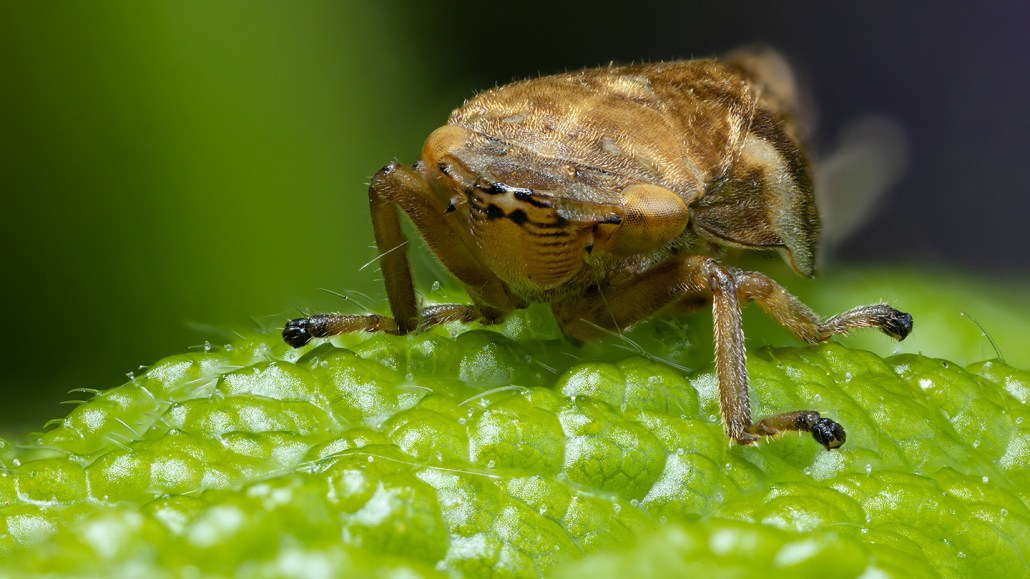
Froghoppers feed exclusively on xylem sap from plants. To access this nutrient-poor liquid, the insects generate extreme suction power.
Philip G.D. Matthews
To tap an unlikely source of nutrition, insects small enough to sit on a pencil eraser have to suck harder than any known creature.
Philaenus spumarius froghoppers pierce plants with their mouthparts to feed solely on xylem sap, a fluid made mostly of water that moves through plants’ internal plumbing. Not only is the substance largely bereft of nutrients, but it’s also under negative pressures, akin to a vacuum. Sucking the sap requires suction power equivalent to a person drinking water from a 100-meter-long straw.
Such a feat seemed so unlikely for the tiny insects that some scientists questioned whether xylem sap truly could be under such negative pressures. But both biomechanical and metabolic evidence suggests that froghoppers can produce negative pressures greater than one megapascal, researchers report July 14 in Proceedings of the Royal Society B.
“It’s incredibly impressive. [The scientists] used a range of techniques to tackle a long-standing problem,” says Jake Socha, a biomechanist at Virginia Tech in Blacksburg who wasn’t involved in the work. “These insects are really well adapted for generating” extreme negative pressures.
The problem is long-standing because measuring negative pressures is tricky. Within xylem, sap is pulled like a string, caught in a tug-of-war between spongy soil and airy leaves. Piercing the plant with pressure probes can easily break that internal tension, so scientists typically use a more indirect method. By cutting off part of a plant and sticking the leafy end in a pressure chamber with the stem sticking out, researchers can turn up the pressure exerted on the outside of the plant until it just exceeds the plant’s internal pressure and xylem sap oozes from the stem. This strategy suggests that the negative pressures of xylem sap can exceed one megapascal.
That tiny froghoppers and other insects feed on xylem sap has stoked skepticism about these measurements, says Philip Matthews, a comparative physiologist at the University of British Columbia in Vancouver. Elephants, for example, only generate 0.02 megapascals of negative pressure when they suck large quantities of water through their trunks (SN: 6/3/21), paltry compared with froghoppers.
Some scientists think “it’s just too energetically expensive to extract this stuff, that [xylem pressures] can’t be that negative,” he says. “It has to be easy to extract if [froghoppers are] going to be surviving on something so dilute.”
Skeptical of the skeptics, Matthews and colleagues sought to measure froghoppers’ sucking abilities through two approaches, one biomechanical and one metabolic. Froghoppers produce suction power with a pumplike structure in their heads, where muscles pull on a membrane to generate negative pressures, akin to a piston. Using micro-CT scans of four insects, the researchers measured the length and strength capacity of these structures, and then calculated the insects’ sucking potential using the simple physical formula of pressure equals force divided by area. In principle, the team found that froghoppers can produce negative pressures from 1.06 to 1.57 megapascals.
“Clearly they can generate these tensions, so they must be feeding at xylem tensions around this level,” Matthews says. “You wouldn’t evolve such a massive capacity unless you were using it.”
The team validated this more abstract estimate by calculating how much energy froghoppers expend while sucking on bean, pea or alfalfa plants. That energy should be proportional to the pressures that the insects have to overcome in plants. By placing feeding froghoppers in chambers that measure expelled carbon dioxide, the researchers could calculate the insects’ metabolic rate. The team also used cameras to track how much liquid the bugs excreted.
Once froghoppers started sucking, their metabolic rate spiked by 50 to 85 percent from resting rates, and the insects were excreting more than when at rest, the researchers found. The effort is “like running a marathon,” Matthews says. “They move a tremendous amount of fluid…. If a bug was human-sized, they’d be peeing 4 liters of liquid a minute.”
Even though xylem sap is mostly water, there’s enough nutrients to power froghoppers’ outsize ability, the researchers estimate. “They’re getting a net-energy gain,” says study coauthor Elisabeth Bergman, a comparative physiologist also of the University of British Columbia.
Bergman and colleagues suspect that the suction power of froghoppers and other xylem sap specialists may be unmatched among animals. There simply aren’t other contexts where food is locked away under such high negative pressures, Bergman says. “These little bugs are just awesome sucking machines.”
